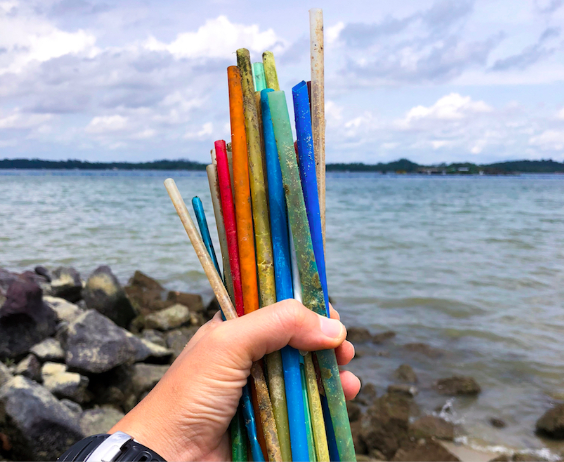
It's been just over a year now since the Oregon Marine Debris Action Plan, a compilation of recommended strategies and actions to prevent, research, and remove marine debris in Oregon, was finalized and set in motion. A year long process followed by a published white paper can often seem like a bureaucratic exercise that leaves you, well, underwhelmed. Surfrider Foundation would have never taken this effort on if we didn't think it would provide for opportunities to advance our plastic pollution initiative, thus, we report to you a one year update below.
 Preventing marine debris and plastic pollution is a major part of the Action Plan and requires inland strategies for reduction, such as working with businesses and consumers on reducing single use items like plastic straws.
Preventing marine debris and plastic pollution is a major part of the Action Plan and requires inland strategies for reduction, such as working with businesses and consumers on reducing single use items like plastic straws.
Oregon Marine Debris Action Plan 2018 Status Update
Linked above you'll find the 1-year status update, a quick reference to what actions have been completed, what's in progress and what's still on the table. First off, a big shout out to NOAA's Marine Debris Program for staying on top of regular updates to the plan and providing partners with opportunities to advance on actions following the plan's completion - it's the necessary administration and encouragement to bring life to the plan and activate marine debris partners on the ground. Secondly, the actions within the plan would not be carried out if it were not for the great work of many partners, agencies and individuals on the ground, both inland and on the coast in Oregon - a big thanks to all the partners!
 Photo: Billeter Marine, Removal of F/V Western - The removal and prioritization of abandoned and derelict vessels and debris is a big part of the Action Plan
Photo: Billeter Marine, Removal of F/V Western - The removal and prioritization of abandoned and derelict vessels and debris is a big part of the Action Plan
Some photos and great highlights from the first year can be found in NOAA's Quarterly Oregon Action Plan Newsletter, but below we offer some the top areas advanced over the past year:
- Supporting Marine Debris Research: Sea Grant and NOAA led a Research Prioritization Workshop to develop Marine Debris Research Priorities for Oregon. These priorities have honed in some great academic and seafood industry work on various concerns with plastic ingestion in marine life as well as supported NGOs to focus cleanup efforts on gathering marine debris data.
- Established Submerged Lands Enhancement Fund: Rules and administration was finalized for this fund within the Department of State Lands to grant dollars for the removal of marine debris on our inland waterways, before it reaches the ocean!
- New Volunteer Marine Debris Programs were formed to support ongoing cleanups at isolated beaches and data collection such as SOLVE's Adopt-A-Beach Program and Surfrider Foundation's Beach Ambassador Program.
- OPRD Beach Rangers Expanded Capacity: Oregon Parks and Recreation expanded the budget for their Beach Rangers, the frontline of marine debris in many cases, from 4 full time positions to 10 full time positions!
 Not snow, plastic! This beach in Coos Bay is covered in polystyrene from a dock that floated out of a nearby Charleston Harbor. This occurred many years ago, but is an example where coordinated actions between State agencies and the Coast Guard could help prevent an environmental disaster.
Not snow, plastic! This beach in Coos Bay is covered in polystyrene from a dock that floated out of a nearby Charleston Harbor. This occurred many years ago, but is an example where coordinated actions between State agencies and the Coast Guard could help prevent an environmental disaster.
This is just a short list and doesn't even come close to demonstrating the breadth of work that has been accomplished in the first year - especially that of our many volunteers, Surfrider Chapters and other marine debris partners. From Newport and Portland Chapter's Ditch the Straw Campaigns to our ongoing partnerships for our Hold on To Your Butts efforts, our chapters and volunteers are really kickin' into gear around the action plan in creative ways!
Brief Background of the Oregon Marine Debris Action Plan & Surfrider Foundation's Role
The Oregon Marine Debris Action Plan process began back in Dec. 2015 when Oregon's Ocean Policy Advisory Council (OPAC) identified marine debris as a new priority for advancing policy and programmatic efforts. Surfrider took the lead on the OPAC priority, creating an informal working group that included Oregon NGOs, local governments, fishermen and state and federal agencies to advance the marine debris planning efforts. By early 2016, the working group had identified NOAA's formal Marine Debris Action Planning process, conducted through several workshops of over 50 participating stakeholder groups and individuals from across Oregon throughout 2016 and early 2017. After a year of planning efforts and workshops, the Oregon Marine Debris Action Plan was successfully completed in April of 2017.
